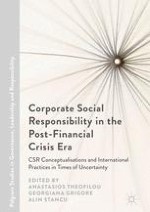2017 | OriginalPaper | Buchkapitel
8. Private–Public Sector Interaction in Terms of Crisis Management for Maintaining Sustainability and Enhancing CSR
verfasst von : Christina Nizamidou, Fotis Vouzas
Erschienen in: Corporate Social Responsibility in the Post-Financial Crisis Era
Aktivieren Sie unsere intelligente Suche, um passende Fachinhalte oder Patente zu finden.
Wählen Sie Textabschnitte aus um mit Künstlicher Intelligenz passenden Patente zu finden. powered by
Markieren Sie Textabschnitte, um KI-gestützt weitere passende Inhalte zu finden. powered by
